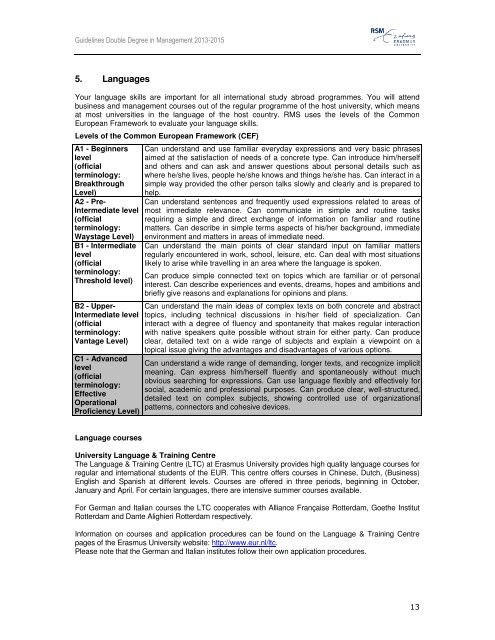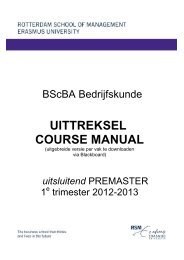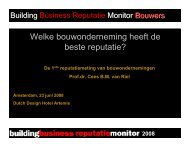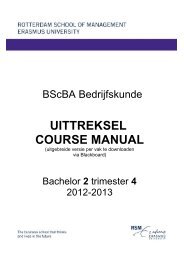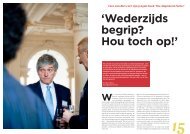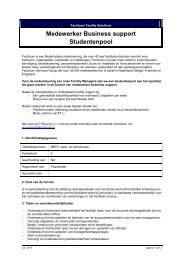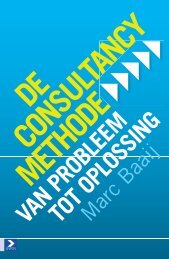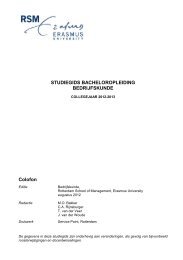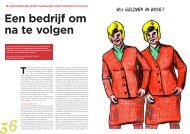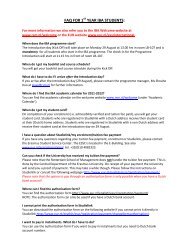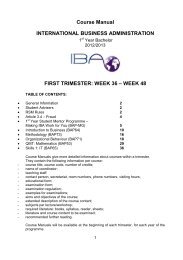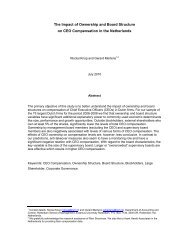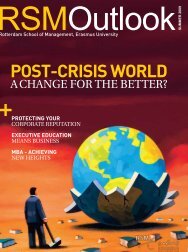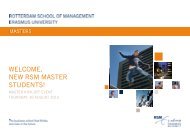Double Master's Degree in Management International - Rotterdam ...
Double Master's Degree in Management International - Rotterdam ...
Double Master's Degree in Management International - Rotterdam ...
Create successful ePaper yourself
Turn your PDF publications into a flip-book with our unique Google optimized e-Paper software.
Guidel<strong>in</strong>es <strong>Double</strong> <strong>Degree</strong> <strong>in</strong> <strong>Management</strong> 2013-2015<br />
5. Languages<br />
Your language skills are important for all <strong>in</strong>ternational study abroad programmes. You will attend<br />
bus<strong>in</strong>ess and management courses out of the regular programme of the host university, which means<br />
at most universities <strong>in</strong> the language of the host country. RMS uses the levels of the Common<br />
European Framework to evaluate your language skills.<br />
Levels of the Common European Framework (CEF)<br />
A1 - Beg<strong>in</strong>ners<br />
level<br />
(official<br />
term<strong>in</strong>ology:<br />
Breakthrough<br />
Level)<br />
A2 - Pre-<br />
Intermediate level<br />
(official<br />
term<strong>in</strong>ology:<br />
Waystage Level)<br />
B1 - Intermediate<br />
level<br />
(official<br />
term<strong>in</strong>ology:<br />
Threshold level)<br />
B2 - Upper-<br />
Intermediate level<br />
(official<br />
term<strong>in</strong>ology:<br />
Vantage Level)<br />
C1 - Advanced<br />
level<br />
(official<br />
term<strong>in</strong>ology:<br />
Effective<br />
Operational<br />
Proficiency Level)<br />
Language courses<br />
Can understand and use familiar everyday expressions and very basic phrases<br />
aimed at the satisfaction of needs of a concrete type. Can <strong>in</strong>troduce him/herself<br />
and others and can ask and answer questions about personal details such as<br />
where he/she lives, people he/she knows and th<strong>in</strong>gs he/she has. Can <strong>in</strong>teract <strong>in</strong> a<br />
simple way provided the other person talks slowly and clearly and is prepared to<br />
help.<br />
Can understand sentences and frequently used expressions related to areas of<br />
most immediate relevance. Can communicate <strong>in</strong> simple and rout<strong>in</strong>e tasks<br />
requir<strong>in</strong>g a simple and direct exchange of <strong>in</strong>formation on familiar and rout<strong>in</strong>e<br />
matters. Can describe <strong>in</strong> simple terms aspects of his/her background, immediate<br />
environment and matters <strong>in</strong> areas of immediate need.<br />
Can understand the ma<strong>in</strong> po<strong>in</strong>ts of clear standard <strong>in</strong>put on familiar matters<br />
regularly encountered <strong>in</strong> work, school, leisure, etc. Can deal with most situations<br />
likely to arise while travell<strong>in</strong>g <strong>in</strong> an area where the language is spoken.<br />
Can produce simple connected text on topics which are familiar or of personal<br />
<strong>in</strong>terest. Can describe experiences and events, dreams, hopes and ambitions and<br />
briefly give reasons and explanations for op<strong>in</strong>ions and plans.<br />
Can understand the ma<strong>in</strong> ideas of complex texts on both concrete and abstract<br />
topics, <strong>in</strong>clud<strong>in</strong>g technical discussions <strong>in</strong> his/her field of specialization. Can<br />
<strong>in</strong>teract with a degree of fluency and spontaneity that makes regular <strong>in</strong>teraction<br />
with native speakers quite possible without stra<strong>in</strong> for either party. Can produce<br />
clear, detailed text on a wide range of subjects and expla<strong>in</strong> a viewpo<strong>in</strong>t on a<br />
topical issue giv<strong>in</strong>g the advantages and disadvantages of various options.<br />
Can understand a wide range of demand<strong>in</strong>g, longer texts, and recognize implicit<br />
mean<strong>in</strong>g. Can express him/herself fluently and spontaneously without much<br />
obvious search<strong>in</strong>g for expressions. Can use language flexibly and effectively for<br />
social, academic and professional purposes. Can produce clear, well-structured,<br />
detailed text on complex subjects, show<strong>in</strong>g controlled use of organizational<br />
patterns, connectors and cohesive devices.<br />
University Language & Tra<strong>in</strong><strong>in</strong>g Centre<br />
The Language & Tra<strong>in</strong><strong>in</strong>g Centre (LTC) at Erasmus University provides high quality language courses for<br />
regular and <strong>in</strong>ternational students of the EUR. This centre offers courses <strong>in</strong> Ch<strong>in</strong>ese, Dutch, (Bus<strong>in</strong>ess)<br />
English and Spanish at different levels. Courses are offered <strong>in</strong> three periods, beg<strong>in</strong>n<strong>in</strong>g <strong>in</strong> October,<br />
January and April. For certa<strong>in</strong> languages, there are <strong>in</strong>tensive summer courses available.<br />
For German and Italian courses the LTC cooperates with Alliance Française <strong>Rotterdam</strong>, Goethe Institut<br />
<strong>Rotterdam</strong> and Dante Alighieri <strong>Rotterdam</strong> respectively.<br />
Information on courses and application procedures can be found on the Language & Tra<strong>in</strong><strong>in</strong>g Centre<br />
pages of the Erasmus University website: http://www.eur.nl/ltc.<br />
Please note that the German and Italian <strong>in</strong>stitutes follow their own application procedures.<br />
13


